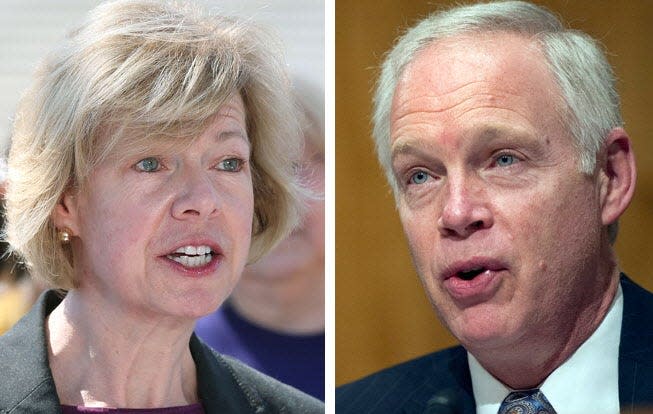Senate passes debt ceiling agreement with Tammy Baldwin, Ron Johnson split over support

- Oops!Something went wrong.Please try again later.
- Oops!Something went wrong.Please try again later.
- Oops!Something went wrong.Please try again later.
- Oops!Something went wrong.Please try again later.
WASHINGTON – The Senate passed a bipartisan bill to suspend the debt ceiling Thursday night in a vote that all but ensures the nation will not default on its debt.
Wisconsin Democratic U.S. Sen. Tammy Baldwin joined 62 of her colleagues in supporting the measure, and Republican Ron Johnson was among 36 senators to oppose the two-year suspension on the amount of money the federal government can borrow to pay its bills.
President Joe Biden, who negotiated the legislation with House Speaker Kevin McCarthy, is expected to quickly sign the measure into law.
"This bipartisan compromise ensures we will not default on our debt, crash our economy and raise costs for Wisconsin families," Baldwin said in her statement supporting the agreement.
She referenced a debt ceiling bill Republicans passed in April that would have dramatically cut domestic spending and eliminated a number of Democratic achievements passed last Congress.
"Extremist Republicans were pushing for devastating cuts that would have hurt Wisconsin families — including gutting veterans' benefits," she said. "We successfully protected our veterans, those on Social Security and Medicare, and investments in our Made in Wisconsin economy."
Johnson, meanwhile, ridiculed the deal for failing to do enough to reduce the nation's deficit. The Congressional Budget Office estimated the agreement would reduce the deficit by about $1.5 trillion over the next 10 years.
"Unfortunately, Democrats seem to have no problem mortgaging our children's future and Republicans haven't figured out a way to stop them," Johnson said after the vote. "I've consistently voted against massive deficit spending, so I'll let those who consistently support it vote to increase the debt ceiling to accomodate their recklessness."
The Senate vote came a day after the House passed the legislation on a strong bipartisan 314-117 vote. Both of Wisconsin's House Democrats voted against the deal, citing in part concerns over funding for domestic programs and tighter work requirements for those seeking federal assistance, and U.S. Rep. Tom Tiffany was the state's only House Republican to oppose the agreement.
The agreement would suspend the country's $31.4 trillion borrowing limit until January 2025 and hold non-defense discretionary spending for fiscal year 2024 at roughly 2023 levels. It would limit spending growth to just 1% in 2025.
Congress under the deal would claw back funding for the IRS — a move the CBO projected would increase the federal deficit — and expand work requirements for low-income people seeking benefits through the Supplemental Nutrition Assistance Program, formerly known as food stamps, and the Temporary Assistance for Needy Families program.
But the measure would also expand food assistance benefits for veterans, homeless people and others, and the CBO estimated about 78,000 more people would gain benefits in an average month under the agreement.
It includes a number of other provisions, including those rescinding unspent COVID relief funds, which could mean $447 million in Wisconsin, and undoes the Biden administration's student loan freeze. It leaves intact major Democratic achievements, like the climate provisions in the Inflation Reduction Act.
Johnson in an interview earlier this week said he would have rather seen a dollar-amount temporary increase in the debt limit rather than a two-year suspension, as passed Thursday night. In a statement, he praised House Republicans' original legislation as the "bare minimum of spending restraint and policy improvements."
After previously saying he was considering introducing amendments to the debt measure, Johnson Thursday night did not introduce any, and all 11 proposed amendments failed.
Any amendment added to the bill would have required a new House vote. With Congress staring down a potential default as soon as Monday, Senate Majority Leader Chuck Schumer made clear such a move would risk default.
"The Biden-McCarthy deal suspended the debt ceiling," Johnson said, "and no one can tell how much additional borrowing will occur as a result."
This article originally appeared on Milwaukee Journal Sentinel: Tammy Baldwin, Ron Johnson split over support of debt ceiling plan

